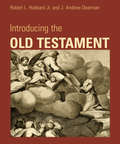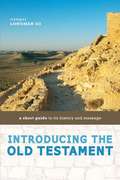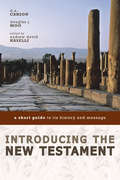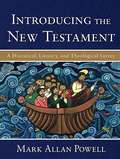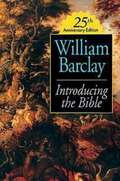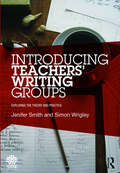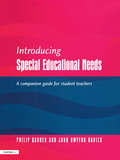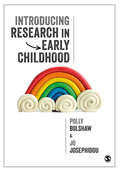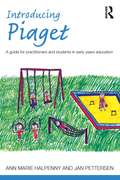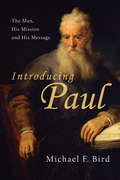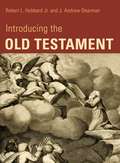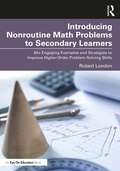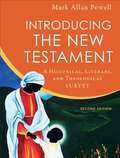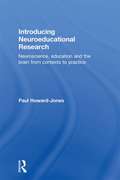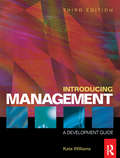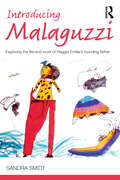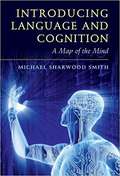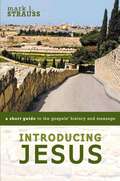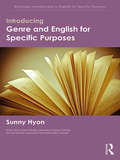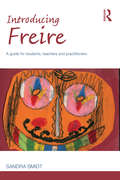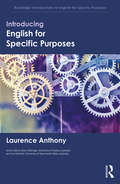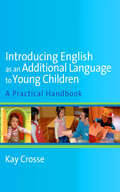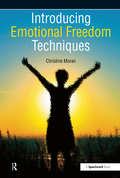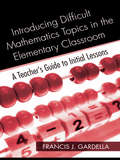- Table View
- List View
Introducing the Old Testament
by Robert L. Hubbard Jr. J. Andrew DearmanThe newest and best Old Testament intro for university and seminary studentsIn this up-to-date, student-friendly text, Robert Hubbard and J. Andrew Dearman bring decades of scholarly study and classroom experience to bear as they introduce readers to the context, composition, and message of the Old Testament.Each chapter orients readers to the Old Testament book or books under consideration, outlining historical and cultural background, literary features, main characters, and structure. Throughout these discussions—of the Torah, the historical books, the prophets, and the poetry—Hubbard and Dearman also identify and trace key theological themes.Replete with maps, illustrations, sidebars, discussion questions, and suggestions for further reading, Introducing the Old Testament will equip students to read, wrestle with, and personally engage these ancient sacred texts.
Introducing the Old Testament: A Short Guide to Its History and Message
by Tremper Longman IIIAn abridged edition of the bestselling book An Introduction to the Old Testament, this rich guide makes Old Testament scholarship accessible to the average reader. Renowned Bible scholar Tremper Longman III gathers the best in historical research and literary analysis to lead the reader through each book of the Old Testament. Most significantly, Longman explores the meaning of each book in light of its cultural setting. Abbreviated chapters highlight key research discoveries, ensuring that the information is both significant and manageable. Including questions at the end of each chapter for group discussion or personal reflection, Introducing the Old Testament makes the words, history, and culture of biblical times come alive for readers. Laypersons as well as church leaders will take away a solid understanding of the historical background and theological message of the Old Testament and be inspired to apply biblical truths to their lives.
Introducing the New Testament: A Short Guide to Its History and Message
by D. A. Carson Douglas J. Moo Andrew David NaselliAbridgement of An Introduction to the Old Testament. This abridged edition of an established major textbook brings the best of New Testament scholarship to the church and makes it accessible to the average reader. This book focuses on historical questions dealing with authorship, date, sources, purpose, and destination of the New Testament books. By focusing on the essentials, the authors ensure that each book is accurately understood within its historical settings. For each New Testament document, the authors also provide a summary of that book’s content and discuss the book’s theological contribution to the overall canon. This abridgement includes questions at the end of each chapter to facilitate group discussion and personal review. It will help a new generation of students and church leaders better grasp the message of the New Testament
Introducing the New Testament: A Historical, Literary, and Theological Survey
by Mark Allan PowellThis book offers an up-to-date New Testament introduction for undergraduate students and general readers. Powell presents disputed and controversial issues fairly, neither dictating conclusions nor privileging skepticism over faith-based perspectives. Includes helpful sidebars, maps, tables, charts, glossary, diagrams, and suggestions for further reading and beautiful artwork illustrating the reception of the New Testament through various times and cultures.
Introducing the Bible
by William Barclay"If you want to keep alive, keep learning. . . . To think is a necessity of the Christian life."
Introducing Teachers’ Writing Groups: Exploring the theory and practice (National Association for the Teaching of English (NATE))
by Jenifer Smith Simon WrigleyTeachers’ writing groups have a significantly positive impact on pupils and their writing. This timely text explains the importance of teachers’ writing groups and how they have evolved. It outlines clearly and accessibly how teachers can set up their own highly effective writing groups. In this practical and informative book, the authors: share the thinking and practice that is embodied by teachers’ writing groups provide practical support for teachers running a group or wishing to write for themselves in order to inform their practice cover major themes such as: the relationship between writing teachers and the teaching of writing; writing as process and pleasure; writing and reflective practice; writing journals and the writing workshop. The authors provide a rationale for the development of writing groups for teachers and for ways of approaching writing that support adult and child writers and this rationale informs the ideas for writing throughout the book. All writing and teaching suggestions have been extensively tried and tested by class teachers, and will be of enormous interest to any teacher or student teacher wishing to run their own successful writing group.
Introducing Special Educational Needs: A Guide for Students
by Philip Gardner John Dwyfor DaviesPressure of time means that the complex topic of special educational needs (SEN) at initial teacher training and post-graduate levels can often be covered at too swift a pace. The unfortunate result is that a newly qualified teacher faced with the pressures of today's typically inclusive classrooms can feel unprepared or lacking in knowledge about this vitally important area.This supportive, accessible text will be invaluable to students undergoing their initial teacher training as it features broad coverage of key aspects of SEN in a single volume. It will provide the reader with succinct information on major SEN themes, key questions for student teachers on each topic, and a selection of the most important readings. It also includes sets of reflection-based student tasks; activities for completion during school placements; practical tutor-led to mentor-led activities, plus extension activities; and a series of suggested topics for school-based assignments in SEN.
Introducing Research in Early Childhood
by Polly Bolshaw Jo Josephidou“What a useful book for the beginner researcher! Offering a grounding in the different kinds of research conducted in the field of early childhood, this book’s inviting and accessible style will support the novice researcher, and the development of criticality in relation to research.” Deborah Albon, Senior Lecturer in Early Childhood Studies, University of Roehampton What does the term ‘research’ in early childhood actually mean? What does research involve, and how do you go about doing it? This book explains exactly what ‘research’ is; it explores key ideas, themes and terminology to provide you with a clear understanding of its importance to your early years or early childhood studies degree. It will help you: · Understand what it means to think critically, and unpick childhood research · Learn how to analyse, examine and understand the importance of others’ research · Get to know how research is designed and carried out · Appreciate the importance of ethics · Get to grips with translating research into real life in an early childhood setting. Laying the foundations to develop your confidence in talking about research and making links between theory and practice, this book will support you as you begin your research journey into the world of early years. Polly Bolshaw is a Senior Lecturer in Early Childhood Studies at Canterbury Christ Church University. Jo Josephidou is a Senior Lecturer in Early Childhood Studies at Canterbury Christ Church University.
Introducing Research in Early Childhood
by Polly Bolshaw Jo Josephidou“What a useful book for the beginner researcher! Offering a grounding in the different kinds of research conducted in the field of early childhood, this book’s inviting and accessible style will support the novice researcher, and the development of criticality in relation to research.” Deborah Albon, Senior Lecturer in Early Childhood Studies, University of Roehampton What does the term ‘research’ in early childhood actually mean? What does research involve, and how do you go about doing it? This book explains exactly what ‘research’ is; it explores key ideas, themes and terminology to provide you with a clear understanding of its importance to your early years or early childhood studies degree. It will help you: · Understand what it means to think critically, and unpick childhood research · Learn how to analyse, examine and understand the importance of others’ research · Get to know how research is designed and carried out · Appreciate the importance of ethics · Get to grips with translating research into real life in an early childhood setting. Laying the foundations to develop your confidence in talking about research and making links between theory and practice, this book will support you as you begin your research journey into the world of early years. Polly Bolshaw is a Senior Lecturer in Early Childhood Studies at Canterbury Christ Church University. Jo Josephidou is a Senior Lecturer in Early Childhood Studies at Canterbury Christ Church University.
Introducing Piaget: A guide for practitioners and students in early years education (Introducing Early Years Thinkers)
by Ann Marie Halpenny Jan PettersenJean Piaget was one of the most significant contributors to our current understanding of how children think and learn, from birth through to adolescence. In this comprehensive and accessible new book, Ann Marie Halpenny and Jan Pettersen capture the key concepts and principles of Piaget’s fascinating work on children’s thinking, and explore how thinking evolves and develops from infancy through the early years and beyond. Areas covered in Introducing Piaget include: key milestones and achievements in children’s thinking; understanding the physical world through senses and movement in infancy; supporting the emergence of symbolic thought and language in the early years; understanding object permanence; implications of egocentric thinking in early childhood learning and development. Throughout the book, the consequences of these developments for children’s social, emotional and intellectual development are discussed. Updates on Piaget’s theory are also outlined with reference to more recent work on cognitive development in childhood. Each chapter provides a concise summary of material presented through a consideration of the implications for practice in working with children. A glossary of key Piagetian terms is also included. With a particular focus on how Piaget’s principles and concepts can be applied to children in early childhood, this exciting new book is an invaluable resource for teachers, practitioners and students with an interest in learning and development in the early years.
Introducing Paul: The Man, His Mission and His Message
by Michael F. BirdMany Christians who know and love the Bible think they know the apostle Paul. He's a theological master, a pastoral mentor, a spiritual adviser and a missionary hero. Yet just when we think we have him in our grasp, he slips through our fingers. At the point where we suppose we have finally understood him, Paul again confounds us. But he also beckons us to explore God's ways more deeply. Michael Bird suggests that if the Paul we claim to know looks and sounds a lot like us, it's probably a warning light that we don't know him as well as we think we do. But if we let Paul be Paul, allowing him to speak for himself in his language, on his terms and for his purposes, then we stand a chance of meeting him anew. Introducing Paul is an animated and penetrating survey of Paul's life and teaching. It covers all the basics students need, while offering new insights with a light touch. Blending life and study, Bird aims to get us excited about reading Paul's letters, sharing his gospel and living the Christian life the way he thought it should be lived. For beginning students and laypeople, Introducing Paul is a valuable entrance into the contemporary study of Paul.
Introducing The Old Testament
by Robert L. Hubbard J. Andrew DearmanThis book has been a long time in coming-too long, perhaps. But as the awesome and long-suffering novelist, Snoopy, once glumly observed, "Good writing is hard work!" Amen to that, Snoopy! But to emerge, a book needs more than just toiling authors who string thoughts into words; it also requires the wisdom, support, and encouragement of other people for it to see the light of day.
Introducing Nonroutine Math Problems to Secondary Learners: 60+ Engaging Examples and Strategies to Improve Higher-Order Problem-Solving Skills
by Robert LondonOffering secondary math educators an innovative holistic and process-orientated approach for implementing nonroutine problems into their curriculum, this book defines and establishes practical strategies to develop students’ problem-solving skills. The text focuses on the process skills necessary to solve nonroutine problems in mathematics and other subjects, with the goal of making students better problem-solvers both in and outside of the classroom. Chapters present and define a curriculum of over 60 nonroutine problems in mathematics and other content areas, and explore the pedagogy to implement this type of curriculum consistent with the NCTM Standards and Principles to Action. Four different models of implementation are discussed, alongside a structured approach through seven difficulty levels (with examples), to ensure that every student, independent of their mastery of mathematics content, can improve their ability to solve nonroutine problems. It emphasizes to students how to transfer their problem-solving skills to other real-world areas, including increasing ecological awareness, appreciating diversity and addressing significant and meaningful problems in their life, school and community. The curriculum introduced in this book can be included as a component of a traditional four-year academic high school curriculum aligned with the Common Core Mathematical Practices, or as part of a one-year isolated required or elective mathematics course. Based on extensive field-testing this approach has been effective in both traditional mathematics courses and math electives such as a course in Problem-Solving. This book provides the necessary guidance to allow each mathematics teacher to effectively integrate the approach in their classrooms. This book is ideal for secondary mathematics teachers of all levels, as well as teachers of mathematics electives.
Introducing The New Testament: A Historical, Literary, And Theological Survey
by Mark PowellThis lively, engaging introduction to the New Testament is critical yet faith-friendly, lavishly illustrated, and accompanied by a variety of pedagogical aids, including sidebars, maps, tables, charts, diagrams, and suggestions for further reading. The full-color interior features art from around the world that illustrates the New Testament's impact on history and culture. The first edition has been well received (over 60,000 copies sold). This new edition has been thoroughly revised in response to professor feedback and features an updated interior design. It offers expanded coverage of the New Testament world in a new chapter on Jewish backgrounds, features dozens of new works of fine art from around the world, and provides extensive new online material for students and professors available through Baker Academic's Textbook eSources.
Introducing Neuroeducational Research: Neuroscience, Education and the Brain from Contexts to Practice
by Paul Howard JonesAmongst educators, scientists and policy-makers there is a growing belief that the field of education can benefit from an understanding of the brain. However, attempts to bring neuroscience and education together have often been hampered by crucial differences in concepts, language and philosophy. In this book, Paul Howard-Jones explores these differences, drawing on the voices of educators and scientists to argue for a new field of enquiry: neuroeducational research. Introducing Neuroeducational Research provides a meaningful bridge between two diverse perspectives on learning. It proposes that any such bridge must serve two goals that are critically related to each other: it must enrich both scientific and educational understanding. This challenge gives rise to unique conceptual, methodological and ethical issues that will inevitably characterise this new field, and these are examined and illustrated here through empirical research. Throughout the book, Paul Howard-Jones: Explores ‘neuromyths’ and their impact on educational research Highlights the opportunities to combine biological, social and experiential evidence in understanding how we learn Argues against a ‘brain-based’ natural science of education Introduces clearly the concept of an interdisciplinary neuroeducational approach Builds a methodology for conducting neuroeducational research Draws on case studies and empirical findings to illustrate how a neuroeducational approach can provide a fuller picture of how we learn. Presenting a blueprint for including our knowledge of the brain in education, this book is essential reading for all those concerned with human learning in authentic contexts: educators, scientists and policy-makers alike.
Introducing Management: A Development Guide
by Kate WilliamsNow fully revised and in its third edition, this comprehensive best-selling text, Introducing Management: A Development Guide, explains the principles and practice of management and is ideal for both new and existing managers to assist them in their role. The text incorporates the latest innovations in management thinking and reflects the changes within the management standards. This is an essential resource for those undertaking qualifications at S/NVQ at Level 3.The learning development is clearly structured in each chapter to include:-Objectives, Insights, Case Studies, Examples, Review Your Learning, Back to Work, allowing the user to check their understanding and apply the concepts and principles to their own work situation.
Introducing Malaguzzi: Exploring the life and work of Reggio Emilia’s founding father (Introducing Early Years Thinkers)
by Sandra SmidtLoris Malaguzzi is recognised as the founder of the extraordinary programmes of preschool education that developed after the war in Reggio Emilia, Italy. Deeply embedded in the cultures and communities they serve, these unique preschools have justifiably become famous throughout the world. In this accessible and engaging text, Sandra Smidt examines how Malaguzzi’s philosophy developed out of his personal experiences of growing up in post-fascist Italy. His ideas are explored and illustrated throughout by examples relating to everyday early years practice. The key themes explored include: relationships — the importance of relationships, culture and contexts to learning within any setting and beyond; transparency — the importance of listening and documentation to understanding and sharing learning; questioning — inviting children to not only answer questions but raise them, allowing them to be equal partners in all learning situations; creativity — finding ways of enabling children to use all the expressive languages they can find to express and share their ideas; equity and fairness — involving the community in all decision-making and discussions, to ensure that early childhood education is accessible and relevant to all children.? This book will be of benefit to all those working with young children and essential reading for students on early childhood education programmes.
Introducing Language and Cognition
by Smith Michael SharwoodIn this accessible introduction, Mike Sharwood Smith provides a working model or 'map' of the mind, with language as its centrepiece. Drawing on cutting-edge research across linguistics, psychology and neuroscience, it allows students to quickly grasp how each separate aspect of the mind's operations can be related. This 'big picture' view includes the way the mind makes, stores and loses memories of all kinds as well how its various 'expert systems' combine and collaborate to solve, typically beyond our conscious awareness, the myriad of tasks we are faced with every minute and millisecond of our existence. The book also focuses on language, that is, the mind of monolingual, bilingual and multilingual speakers. It will be of interest to all students wishing to learn more about the complex relationship between language - one of the most important ways in which we define ourselves as human - and the mind.
Introducing Jesus: A Short Guide to the Gospels' History and Message
by Mark L. StraussTo Christians worldwide, the man Jesus of Nazareth is the centerpiece of history, the object of faith, hope, and worship. Even those who do not follow him admit the vast influence of his life. For anyone interested in knowing more about Jesus, study of the four biblical Gospels is essential.An abridged edition of the bestselling textbook Four Portraits, One Jesus by Mark Strauss, this simple, easy-to-understand guide introduces the four biblical Gospels and their subject, the life and person of Jesus.Like different artists rendering the same subject using different styles and points of view, the Gospels paint four distinctive portraits of the same remarkable Jesus. With clarity and insight, Mark Strauss addresses questions that surround the study of Jesus and the Gospels. What are the Gospels - are they history, theology, biography? Where did they come from? What do we know about their context? What does each Gospel uniquely teach us about Jesus? Finally, he pulls it all together illuminating what the Gospels together teach about Jesus' ministry, message, death, and resurrection, and how do we know we can trust their witness.Including questions at the end of each chapter for group discussion or personal reflection, Introducing Jesus makes the words, history, and context of the Gospels come alive for readers.
Introducing Genre and English for Specific Purposes (Routledge Introductions to English for Specific Purposes)
by Sunny HyonGenre analysis has become a key approach within the field of English for Specific Purposes and helps students understand particular language use patterns in target contexts. Introducing Genre and English for Specific Purposes provides an overview of how genre has been conceptualized and applied in ESP, as well as the features that distinguish ESP genre research and teaching from those of other genre schools. The macro and micro aspects of ESP genre-based pedagogy are also analysed and include: different possibilities for planning and designing an ESP genre-based course; the concrete, micro aspects of materials creation; and how genres can be learned through play. Introducing Genre and English for Specific Purposes is essential reading for students and pre-service teachers who are studying Genre, English for Specific Purposes or language teaching methodologies.
Introducing Freire: A guide for students, teachers and practitioners (Introducing Early Years Thinkers)
by Sandra SmidtThe famous Brazilian educator Paulo Freire has influenced educators, teachers and students in a broad tapestry of contexts and countries, as he challenged conventional thinking on how teachers ought to teach and learners ought to learn. By making his ideas accessible and relevant, this insightful and thought-provoking text draws out the relevance and topicality of Freire’s work and applies this to a wide range of educational settings, from adult education, through schools, to early years settings. Themes covered include: the lasting impact of illiteracy; the benefits and potential in becoming literate; literacy, language and power; the differences between banking and dialogic education; the social and political nature of learning. what kind of teaching and learning do we want? Using a variety of practical examples and case studies, Introducing Freire is an essential guide to the work of one of the most significant figures in education in the last century. Fascinating and accessible, this book is for anyone interested in teaching and learning, poverty and affluence, power and powerlessness, and society and change.
Introducing English for Specific Purposes (Routledge Introductions to English for Specific Purposes)
by Laurence AnthonyIntroducing English for Specific Purposes presents the key concepts and practices of ESP in a modern, balanced, and comprehensive way. This book defines ESP and shows how the approach plays a crucial role in the world of English language teaching. Explaining how needs analysis, language and learning objectives, materials and methods, and evaluation combine to form the four main pillars of ESP, the book includes: practical examples that illustrate how the core theories and practices of ESP can be applied in real-world academic and occupational settings; discussion of some of the most hotly debated issues in ESP; insights on how ESP courses can be organized and integrated to form a complete program; reflection boxes, practical tasks, extension research questions, and resources for further reading in each chapter. Introducing English for Specific Purposes serves as an ideal textbook for graduate and advanced undergraduate students studying courses on English for Specific Purposes or English for Academic Purposes, as part of degrees in English for Specific Purposes, Education, ELT, Applied Linguistics, TESOL or TEFL. This comprehensive publication is also an invaluable reference resource for pre-service and in-service teachers of ESP, and for English program managers and administrators.
Introducing English as an Additional Language to Young Children: A Practical Handbook
by Kay Crosse`A definite must-have for all teachers of English confronted with early multilingualism' - Times Educational Supplement The activities and guidance in this book will help teachers to develop the confidence and meet the individual needs of young children with English as an additional language across different settings. There are also practical and varied language teaching strategies to promote learning for children working individually or in small groups. The first part of the book focuses on the introduction and development of oral language skills and the particular needs of young "additional English language learners" settling into a new environment. It provides an introduction to the Foundation Stage curriculum and the ways in which links can be made with English as an additional language activity. The second part of the book presents practical activities grouped under the six areas of learning forming the early years curriculum. Each activity includes an appropriate objective, materials and preparation, key vocabulary to focus on and extension suggestions, as well as full guidance on how to manage the activity effectively. The book will be a valuable resource for all teachers, teaching assistants and other early years staff in day nurseries, nursery schools and other early years settings. Kay Crosse is a freelance early years consultant and was formerly head of Norland College.
Introducing Emotional Freedom Techniques
by Moran ChristineThis title offers simple and effective techniques for emotional health and wellbeing. Emotional Freedom Techniques (EFT) is an energy therapy that is rapidly gaining recognition as a simple, yet very effective way to aid emotional and physical wellbeing. The techniques empower individuals to make their own changes in their thinking and feeling, by combining focus on an issue whilst tapping on the body's energy system. EFT provides highly flexible, easy-to-use and practical solutions for a huge range of emotional issues across all age groups. This book is a comprehensive information resource and 'how to' guide for health professionals and adults to introduce EFT into their day-to-day lives. It provides an extensive exploration of how EFT can be successfully applied to a wide range of social, emotional, behavioural and health issues. It includes case examples of phobias, fears, issues around behaviour, confidence, health issues, speech problems, depression, stress, anger, addictions, abuse, performance issues and managing pain. It offers an overview of some of the latest perspectives within neuroscience and physiology which reflect the changes that occur naturally when using EFT.
Introducing Difficult Mathematics Topics in the Elementary Classroom: A Teacher’s Guide to Initial Lessons
by Francis J. GardellaThis exciting text for the pre-service elementary teacher provides hands on mathematics lessons they can use to introduce mathematical concepts and skills that students find particularly challenging. Each chapter is divided into four sections: The Activity employs an engaging thought experiment to help the reader "visit a classroom" to understand how the lesson used to introduce the concept or skill would materialize in the class. The Mathematics provides the necessary mathematical background used in the lesson to make the actual teaching/learning situation comfortable for both the teachers and the learner. The Plan provides the reader with an actual lesson plan to engage the Activity in the classroom setting. Putting It All Together pulls the previous sections together with a summary of the chapter as well as further information for making the lesson successful. By providing models of what excellent lessons on a given topic look like, knowledge of the mathematics involved, and a concrete lesson plan structure this much-needed resource is the definitive mathematics planning vehicle that every teacher will want before they set foot in their own elementary classroom.
